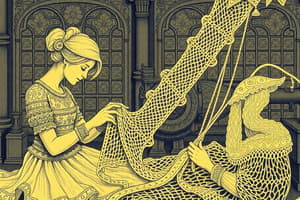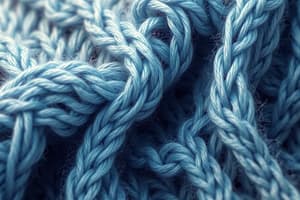Podcast
Questions and Answers
In knitting, what is the term for the horizontal rows of needle loops produced by adjacent needles during the same knitting cycle?
In knitting, what is the term for the horizontal rows of needle loops produced by adjacent needles during the same knitting cycle?
- Wales
- Weft
- Courses (correct)
- Sinker loops
Which textile fabric is produced by intersecting two sets of yarn, warp and weft, which cross and interweave at right angles to each other?
Which textile fabric is produced by intersecting two sets of yarn, warp and weft, which cross and interweave at right angles to each other?
- Non-woven fabric
- Braided fabric
- Woven fabric (correct)
- Knitted fabric
What is the main distinguishing factor between knitting and weaving in terms of the yarn used to create fabric?
What is the main distinguishing factor between knitting and weaving in terms of the yarn used to create fabric?
- Quality of the yarns used (correct)
- Thickness of the yarns used
- Number of yarn sets used
- Elasticity of the yarns used
Which textile fabric is known for its tendency to snag or run in weft knits?
Which textile fabric is known for its tendency to snag or run in weft knits?
What is the term for the vertical column of intermeshed loops produced by the same needle during successive knitting cycles?
What is the term for the vertical column of intermeshed loops produced by the same needle during successive knitting cycles?
In which region were socks recovered from fourth century tombs in Egypt made using a form of looping known as nalbinding?
In which region were socks recovered from fourth century tombs in Egypt made using a form of looping known as nalbinding?
Who invented weft knitting in 1589?
Who invented weft knitting in 1589?
Which method of interlocking loops to create hand and machine knitted fabric uses a single sewing needle instead of two knitting needles?
Which method of interlocking loops to create hand and machine knitted fabric uses a single sewing needle instead of two knitting needles?
When was warp knitting invented?
When was warp knitting invented?
Where were modernized knitting techniques like seamless garment and fully fashion garments widely produced?
Where were modernized knitting techniques like seamless garment and fully fashion garments widely produced?
In the depicted construction, how many float stitches are there?
In the depicted construction, how many float stitches are there?
What is the main characteristic of a float stitch in a knitted fabric?
What is the main characteristic of a float stitch in a knitted fabric?
What problem is a long float in a knitted fabric likely to cause?
What problem is a long float in a knitted fabric likely to cause?
What is the distinctive feature of a tuck stitch in knitting?
What is the distinctive feature of a tuck stitch in knitting?
How does a tuck stitch affect neighboring wale lines in knitted fabric?
How does a tuck stitch affect neighboring wale lines in knitted fabric?
What is the simplest of all weft knitted constructions produced on machines employing only one set of needles?
What is the simplest of all weft knitted constructions produced on machines employing only one set of needles?
Which structural element of a knitted fabric is formed when the two zones of interlacement around the base are eliminated from a loop stitch?
Which structural element of a knitted fabric is formed when the two zones of interlacement around the base are eliminated from a loop stitch?
In knitting, what is the term for the straight segment of yarn that materializes when all the four binding zones around a loop stitch are removed?
In knitting, what is the term for the straight segment of yarn that materializes when all the four binding zones around a loop stitch are removed?
What can be formed by combining loop, tuck, and float stitches judiciously in a knitted fabric?
What can be formed by combining loop, tuck, and float stitches judiciously in a knitted fabric?
In a hypothetical construction involving loop, tuck, and float stitches, what structural element is shown in Fig. 11 of the text?
In a hypothetical construction involving loop, tuck, and float stitches, what structural element is shown in Fig. 11 of the text?
Flashcards are hidden until you start studying
Study Notes
Knitting Terminology
- The term for the horizontal rows of needle loops produced by adjacent needles during the same knitting cycle is course.
- Woven fabric is produced by intersecting two sets of yarn, warp and weft, which cross and interweave at right angles to each other.
Knitting vs. Weaving
- The main distinguishing factor between knitting and weaving in terms of the yarn used to create fabric is that knitting uses single thread while weaving uses two sets of threads.
Textile Fabric Characteristics
- Weft knits are known for their tendency to snag or run.
- Nalbinding is a form of looping known for producing socks recovered from fourth-century tombs in Egypt.
Knitting History
- Reverend William Lee invented weft knitting in 1589.
- Warp knitting was invented in 1846.
Knitting Techniques
- Nalbinding is a method of interlocking loops to create hand and machine knitted fabric using a single sewing needle instead of two knitting needles.
- Modernized knitting techniques like seamless garment and fully fashion garments were widely produced in Italy.
Knitted Fabric Construction
- The depicted construction has 2 float stitches.
- The main characteristic of a float stitch in a knitted fabric is that it is not intermeshed with the neighboring wale lines.
- A long float in a knitted fabric is likely to cause snagging or running.
- The distinctive feature of a tuck stitch in knitting is that it creates an extra loop on the needle.
- A tuck stitch affects neighboring wale lines in knitted fabric by not intermeshing with them.
Simple Weft Knitted Constructions
- The simplest of all weft knitted constructions produced on machines employing only one set of needles is plain knitting.
Structural Elements of Knitted Fabric
- A roving is formed when the two zones of interlacement around the base are eliminated from a loop stitch.
- A yarn segment is the straight segment of yarn that materializes when all the four binding zones around a loop stitch are removed.
- Complex fabric constructions can be formed by combining loop, tuck, and float stitches judiciously in a knitted fabric.
- In a hypothetical construction involving loop, tuck, and float stitches, a roving is shown in Fig. 11 of the text.
Studying That Suits You
Use AI to generate personalized quizzes and flashcards to suit your learning preferences.




